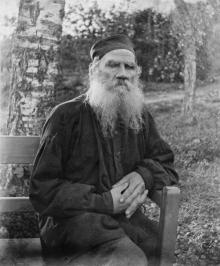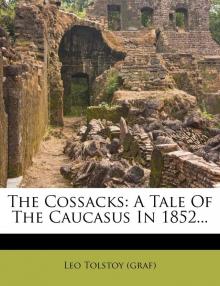- Home
- graf Leo Tolstoy
The Kingdom of God Is Within You Page 17
The Kingdom of God Is Within You Read online
Page 17
"The paid politicians, the ambitious statesmen, who exploit the evil passions of the populace, and the imbeciles who are deluded by fine-sounding phrases, have so embittered national feuds that the existence of a whole race will be at stake in the war of the morrow. One of the elements that constitute the modern world is threatened, the conquered people will be wiped out of existence, and whichever it may be, we shall see a moral force annihilated, as if there were too many forces to work for good—we shall have a new Europe formed on foundations so unjust, so brutal, so sanguinary, stained with so monstrous a crime, that it cannot but be worse than the Europe of to-day—more iniquitous, more barbarous, more violent.
"Thus one feels crushed under the weight of an immense discouragement. We are struggling in a CUL DE SAC with muskets aimed at us from the housetops. Our labor is like that of sailors executing their last task as the ship begins to sink. Our pleasures are those of the condemned victim, who is offered his choice of dainties a quarter of an hour before his execution. Thought is paralyzed by anguish, and the most it is capable of is to calculate—interpreting the vague phrases of ministers, spelling out the sense of the speeches of sovereigns, and ruminating on the words attributed to diplomatists reported on the uncertain authority of the newspapers—whether it is to be to-morrow or the day after, this year or the next, that we are to be murdered. So that one might seek in vain in history an epoch more insecure, more crushed under the weight of suffering" [footnote: "Le Sens de la Vie," pp. 208-13].
Here it is pointed out that the force is in the hands of those who work their own destruction, in the hands of the individual men who make up the masses; it is pointed out that the source of the evil is the government. It would seem evident that the contradiction between life and conscience had reached the limit beyond which it cannot go, and after reaching this limit some solution of it must be found.
But the author does not think so. He sees in this the tragedy of human life, and after depicting all the horror of the position he concludes that human life must be spent in the midst of this horror.
So much for the attitude to war of those who regard it as something tragic and fated by destiny.
The third category consists of men who have lost all conscience and, consequently, all common sense and feeling of humanity.
To this category belongs Moltke, whose opinion has been quoted above by Maupassant, and the majority of military men, who have been educated in this cruel superstition, live by it, and consequently are often in all simplicity convinced that war is not only an inevitable, but even a necessary and beneficial thing. This is also the view of some civilians, so-called educated and cultivated people.
Here is what the celebrated academician Camille Doucet writes in reply to the editor of the REVUE DES REVUES, where several letters on war were published together:
"Dear Sir: When you ask the least warlike of academicians whether he is a partisan of war, his answer is known beforehand.
"Alas! sir, you yourself speak of the pacific ideal inspiring your generous compatriots as a dream.
"During my life I have heard a great many good people protest against this frightful custom of international butchery, which all admit and deplore; but how is it to be remedied?
"Often, too, there have been attempts to suppress dueling; one would fancy that seemed an easy task: but not at all! All that has been done hitherto with that noble object has never been and never will be of use.
"All the congresses of both hemispheres may vote against war, and against dueling too, but above all arbitrations, conventions, and legislations there will always be the personal honor of individual men, which has always demanded dueling, and the interests of nations, which will always demand war.
"I wish none the less from the depths of my heart that the
Congress of Universal Peace may succeed at last in its very
honorable and difficult enterprise.
"I am, dear sir, etc.,
"CAMILLE DOUCET."
The upshot of this is that personal honor requires men to fight, and the interests of nations require them to ruin and exterminate each other. As for the efforts to abolish war, they call for nothing but a smile.
The opinion of another well-known academician, Jules Claretie, is of the same kind.
"Dear Sir [he writes]: For a man of sense there can be but one
opinion on the subject of peace and war.
"Humanity is created to live, to live free, to perfect and ameliorate its fate by peaceful labor. The general harmony preached by the Universal Peace Congress is but a dream perhaps, but at least it is the fairest of all dreams. Man is always looking toward the Promised Land, and there the harvests are to ripen with no fear of their being torn up by shells or crushed by cannon wheels… But! Ah! but——since philosophers and philanthropists are not the controlling powers, it is well for our soldiers to guard our frontier and homes, and their arms, skillfully used, are perhaps the surest guarantee of the peace we all love.
"Peace is a gift only granted to the strong and the resolute.
"I am, dear sir, etc.,
"JULES CLARETIE."
The upshot of this letter is that there is no harm in talking about what no one intends or feels obliged to do. But when it comes to practice, we must fight.
And here now is the view lately expressed by the most popular novelist in Europe, Émile Zola:
"I regard war as a fatal necessity, which appears inevitable for us from its close connection with human nature and the whole constitution of the world. I should wish that war could be put off for the longest possible time. Nevertheless, the moment will come when we shall be forced to go to war. I am considering it at this moment from the standpoint of universal humanity, and making no reference to our misunderstanding with Germany—a most trivial incident in the history of mankind. I say that war is necessary and beneficial, since it seems one of the conditions of existence for humanity. War confronts us everywhere, not only war between different races and peoples, but war too, in private and family life. It seems one of the principal elements of progress, and every step in advance that humanity has taken hitherto has been attended by bloodshed.
"Men have talked, and still talk, of disarmament, while disarmament is something impossible, to which, even if it were possible, we ought not to consent. I am convinced that a general disarmament throughout the world would involve something like a moral decadence, which would show itself in general feebleness, and would hinder the progressive advancement of humanity. A warlike nation has always been strong and flourishing. The art of war has led to the development of all the other arts. History bears witness to it. So in Athens and in Rome, commerce, manufactures, and literature never attained so high a point of development as when those cities were masters of the whole world by force of arms. To take an example from times nearer our own, we may recall the age of Louis XIV. The wars of the Grand Monarque were not only no hindrance to the progress of the arts and sciences, but even, on the contrary, seem to have promoted and favored their development."
So war is a beneficial thing!
But the best expression of this attitude is the view of the most gifted of the writers of this school, the academician de Vogüé. This is what he writes in an article on the Military Section of the Exhibition of 1889:
"On the Esplanade des Invalides, among the exotic and colonial encampments, a building in a more severe style overawes the picturesque bazaar; all these fragments of the globe have come to gather round the Palace of War, and in turn our guests mount guard submissively before the mother building, but for whom they would not be here. Fine subject for the antithesis of rhetoric, of humanitarians who could not fail to whimper over this juxtaposition, and to say that 'CECI TUERA CELA,' [footnote: Phrase quoted from Victor-Hugo, "Notre-Dame de Paris."] that the union of the nations through science and labor will overcome the instinct of war. Let us leave them to cherish the chimera of a golden age, which would soon become, if it could be realized, an age of mud.
All history teaches us that the one is created for the other, that blood is needed to hasten and cement the union of the nations. Natural science has ratified in our day the mysterious law revealed to Joseph de Maistre by the intuition of his genius and by meditation on fundamental truths; he saw the world redeeming itself from hereditary degenerations by sacrifice; science shows it advancing to perfection through struggle and violent selection; there is the statement of the same law in both, expressed in different formulas. The statement is disagreeable, no doubt; but the laws of the world are not made for our pleasure, they are made for our progress. Let us enter this inevitable, necessary palace of war; we shall be able to observe there how the most tenacious of our instincts, without losing any of its vigor, is transformed and adapted to the varying exigencies of historical epochs."
M. de Vogüé finds the necessity for war, according to his views, well expressed by the two great writers, Joseph de Maistre and Darwin, whose statements he likes so much that he quotes them again.
"Dear Sir [he writes to the editor of the REVUE DES REVUES]: You ask me my view as to the possible success of the Universal Congress of Peace. I hold with Darwin that violent struggle is a law of nature which overrules all other laws; I hold with Joseph de Maistre that it is a divine law; two different ways of describing the same thing. If by some impossible chance a fraction of human society—all the civilized West, let us suppose—were to succeed in suspending the action of this law, some races of stronger instincts would undertake the task of putting it into action against us: those races would vindicate nature's reasoning against human reason; they would be successful, because the certainty of peace—I do not say PEACE, I say the CERTAINTY OF PEACE—would, in half a century, engender a corruption and a decadence more destructive for mankind than the worst of wars. I believe that we must do with war—the criminal law of humanity—as with all our criminal laws, that is, soften them, put them in force as rarely as possible; use every effort to make their application unnecessary. But all the experience of history teaches us that they cannot be altogether suppressed so long as two men are left on earth, with bread, money, and a woman between them.
"I should be very happy if the Congress would prove me in error. But I doubt if it can prove history, nature, and God in error also.
"I am, dear sir, etc.
"E. M. DE VOGÜÉ."
This amounts to saying that history, human nature, and God show us that so long as there are two men, and bread, money and a woman—there will be war. That is to say that no progress will lead men to rise above the savage conception of life, which regards no participation of bread, money (money is good in this context) and woman possible without fighting.
They are strange people, these men who assemble in Congresses, and make speeches to show us how to catch birds by putting salt on their tails, though they must know it is impossible to do it. And amazing are they too, who, like Maupassant, Rod, and many others, see clearly all the horror of war, all the inconsistency of men not doing what is needful, right, and beneficial for them to do; who lament over the tragedy of life, and do not see that the whole tragedy is at an end directly men, ceasing to take account of any unnecessary considerations, refuse to do what is hateful and disastrous to them. They are amazing people truly, but those who, like De Vogüé and others, who, professing the doctrine of evolution, regard war as not only inevitable, but beneficial and therefore desirable—they are terrible, hideous, in their moral perversion. The others, at least, say that they hate evil, and love good, but these openly declare that good and evil do not exist.
All discussion of the possibility of re-establishing peace instead of everlasting war—is the pernicious sentimentality of phrasemongers. There is a law of evolution by which it follows that I must live and act in an evil way; what is to be done? I am an educated man, I know the law of evolution, and therefore I will act in an evil way. "ENTRONS AU PALAIS DE LA GUERRE." There is the law of evolution, and therefore there is neither good nor evil, and one must live for the sake of one's personal existence, leaving the rest to the action of the law of evolution. This is the last word of refined culture, and with it, of that overshadowing of conscience which has come upon the educated classes of our times. The desire of the educated classes to support the ideas they prefer, and the order of existence based on them, has attained its furthest limits. They lie, and delude themselves, and one another, with the subtlest forms of deception, simply to obscure, to deaden conscience.
Instead of transforming their life into harmony with their conscience, they try by every means to stifle its voice. But it is in darkness that the light begins to shine, and so the light is rising upon our epoch.
CHAPTER VII.
SIGNIFICANCE OF COMPULSORY SERVICE.
Universal Compulsory Service is not a Political Accident, but the Furthest Limit of the Contradiction Inherent in the Social Conception of Life—Origin of Authority in Society—Basis of Authority is Physical Violence—To be Able to Perform its Acts of Violence Authority Needs a Special Organization—The Army—Authority, that is, Violence, is the Principle which is Destroying the Social Conception of Life—Attitude of Authority to the Masses, that is, Attitude of Government to Working Oppressed Classes—Governments Try to Foster in Working Classes the Idea that State Force is Necessary to Defend Them from External Enemies—But the Army is Principally Needed to Preserve Government from its own Subjects—The Working Classes—Speech of M. de Caprivi—All Privileges of Ruling Classes Based on Violence—The Increase of Armies up to Point of Universal Service—Universal Compulsory Service Destroys all the Advantages of Social Life, which Government is Intended to Preserve—Compulsory Service is the Furthest Limit of Submission, since in Name of the State it Requires Sacrifice of all that can be Precious to a Man—Is Government Necessary?—The Sacrifices Demanded by Government in Compulsory Service have No Longer any Reasonable Basis—And there is More Advantage to be Gained by not Submitting to the Demands of the State than by Submitting to Them.
Educated people of the upper classes are trying to stifle the ever-growing sense of the necessity of transforming the existing social order. But life, which goes on growing more complex, and developing in the same direction, and increases the inconsistencies and the sufferings of men, brings them to the limit beyond which they cannot go. This furthest limit of inconsistency is universal compulsory military service.
It is usually supposed that universal military service and the increased armaments connected with it, as well as the resulting increase of taxes and national debts, are a passing phenomenon, produced by the particular political situation of Europe, and that it may be removed by certain political combinations without any modification of the inner order of life.
This is absolutely incorrect. Universal military service is only the internal inconsistency inherent in the social conception of life, carried to its furthest limits, and becoming evident when a certain stage of material development is reached.
The social conception of life, we have seen, consists in the transfer of the aim of life from the individual to groups and their maintenance—to the tribe, family, race, or state.
In the social conception of life it is supposed that since the aim of life is found in groups of individuals, individuals will voluntarily sacrifice their own interests for the interests of the group. And so it has been, and still is, in fact, in certain groups, the distinction being that they are the most primitive forms of association in the family or tribe or race, or even in the patriarchal state. Through tradition handed down by education and supported by religious sentiment, individuals without compulsion merged their interests in the interest of the group and sacrificed their own good for the general welfare.
But the more complex and the larger societies become, and especially the more often conquest becomes the cause of the amalgamation of people into a state, the more often individuals strive to attain their own aims at the public expense, and the more often it becomes necessary to restrain these insubordinate individual
s by recourse to authority, that is, to violence. The champions of the social conception of life usually try to connect the idea of authority, that is, of violence, with the idea of moral influence, but this connection is quite impossible.
The effect of moral influence on a man is to change his desires and to bend them in the direction of the duty required of him. The man who is controlled by moral influence acts in accordance with his own desires. Authority, in the sense in which the word is ordinarily understood, is a means of forcing a man to act in opposition to his desires. The man who submits to authority does not do as he chooses but as he is obliged by authority. Nothing can oblige a man to do what he does not choose except physical force, or the threat of it, that is—deprivation of freedom, blows, imprisonment, or threats—easily carried out—of such punishments. This is what authority consists of and always has consisted of.
In spite of the unceasing efforts of those who happen to be in authority to conceal this and attribute some other significance to it, authority has always meant for man the cord, the chain with which he is bound and fettered, or the knout with which he is to be flogged, or the ax with which he is to have hands, ears, nose, or head cut off, or at the very least, the threat of these terrors. So it was under Nero and Ghenghis Khan, and so it is to-day, even under the most liberal government in the Republics of the United States or of France. If men submit to authority, it is only because they are liable to these punishments in case of non-submission. All state obligations, payment of taxes, fulfillment of state duties, and submission to punishments, exile, fines, etc., to which people appear to submit voluntarily, are always based on bodily violence or the threat of it.
The basis of authority is bodily violence. The possibility of applying bodily violence to people is provided above all by an organization of armed men, trained to act in unison in submission to one will. These bands of armed men, submissive to a single will, are what constitute the army. The army has always been and still is the basis of power. Power is always in the hands of those who control the army, and all men in power—from the Roman Caesars to the Russian and German Emperors—take more interest in their army than in anything, and court popularity in the army, knowing that if that is on their side their power is secure.

 Anna Karenina
Anna Karenina Sevastopol
Sevastopol The Cossacks: A Tale of 1852
The Cossacks: A Tale of 1852 The Kingdom of God Is Within You
The Kingdom of God Is Within You